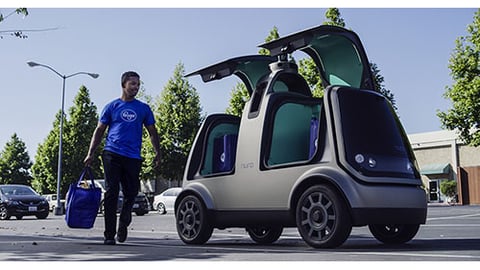Consumers Anticipate More Self-Checkout Stores, Driverless Delivery in 5 Years
Shoppers expect grocery stores will be primarily self-checkout and regularly use driverless cars for order deliveries within the next five years.
That's among the findings of solid-state cooling solution provider Phononic’s second annual "Store of the Future Report," which surveyed more than 1,100 U.S. consumers on their shopping habits and preferences.
Notably, 89 percent of respondents said that it was important for grocery stores to use technology to make checkout faster, with 79 percent predicting that the majority of supermarkets will be mainly self-checkout in five years. In fact, in a recent real-world example of this, an urban-format Harris Teeter store in Charlotte, N.C., just converted to offer only self-checkouts.
As for self-driving cars like those currently being introduced by such grocers as Kroger, 56 percent of respondents said that it was likely that grocery deliveries would be transported by such vehicles in five years’ time.
Regarding other store predictions, more than half (52 percent) of respondents said that they expected to see placement of frozen and refrigerated items throughout the store, rather than just in the traditional chilled section along the back or side of the store.
“In just the past year, we have witnessed a huge amount of disruption in the food retail landscape as Amazon continues to put pressure on traditional grocers to differentiate the customer experience and offer increased in-store efficiency,” noted Dana Krug, VP and general manager for food and beverage at Durham, N.C.-based Phononic. “Consumers’ feedback demonstrates the need for grocers to embrace technology options that make the shopping experience easier and more enjoyable. And as we look towards the future, it’s clear that consumers have some high expectations for the technology applications they expect grocers to invest in – from cashier-less checkout to self-driving car delivery.”
The report’s findings on consumers’ attitudes toward shopping are as follows:
The majority of survey respondents find grocery shopping a chore, with half (50 percent) saying that grocery shopping is something they have to do but don’t particularly want to. Another 12 percent said that they’d be happy never visit a grocery store again.
- For those who enjoy shopping, they’re attracted by the communal aspect and opportunity for product discovery, with 28 percent saying they “love” the experience of shopping at their local store where they know people and people know them. This feeling is particularly strong among Millennials, who are more likely than any other generation (36 percent) to appreciate the communal aspect of grocery shopping. Further, 30 percent of respondents likened grocery to a “mini-holiday,” enabling them to browse aisles and hunt for treasures.
- Respondents greatly prefer to buy from brands that care about sustainability and giving back, with 73 percent gravitating to such companies.
- Although meal kits have garnered a lot of press in the past couple of years, 58 percent of respondents said they hadn’t tried them yet. Although the number of consumers who tried such a service rose from 34 percent last year to 42 percent this year, respondents continued to cite various obstacles concerning convenience, cost and storage.
- Another reason for this relatively slow adoption rate of meal-kit services is that many shoppers want to choose their own ingredients for meals, with more than half (52 percent) of consumers citing the in-store experience of selecting their own foods as the reason they haven’t tried a meal-kit service.
- One response seemed more like a warning: 51 percent of those surveyed said that if grocery stores don't remain relevant, more people will seek other ways to obtain food. The report noted, however, that this was a slight decrease from 56 percent last year, indicating that consumers appreciated retailers' attempts to keep up with technological and other innovations.





